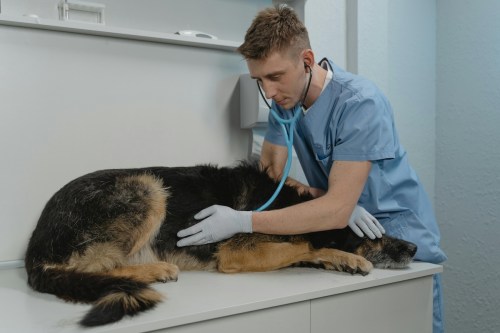
Taking your dog or cat to the vet might cause you some anxiety, especially if you’re doing so for the first time. Trust us, it makes pet ownership so much more enjoyable when you have an animal doctor that both of you like. Choosing the right veterinarian for your beloved companions may not be easy, but it’s certainly worth it — you’ll have a better time caring for your animals, and they will stick around longer with excellent medical attention. Here’s how to choose a vet.
When should I look for a vet?
Referrals can help you find a good veterinarian
When picking a veterinarian, talk to family, neighbors, and friends to see who they use and if they would recommend them for your pet. Ask how long they have been using the vet and what they like about him or her. You can also talk to breeders or breed club members who probably know veterinarians knowledgeable about your breed and the types of problems they experience. Groomers, managers at local animal shelters, members of local animal rescue groups, and local dog trainers can also help when it comes to recommending veterinary professionals. Once you have a list of names, you can visit the animal hospital website and read client reviews.
If you don’t find what you are looking for through referrals, you can turn to your state’s veterinary society for a list of reputable professionals, many broken down by specialty. For example, the New York State Veterinary Medical Society (NYSVMS) offers search functions that include such categories as emergency hospitals, avian/exotic/reptile, and equine, and it even has a category for practices that cater to low-income clients or offer reduced fees. According to the NYSVMS, all veterinarians listed on the site are actively involved in the profession through membership in the society. All members are required to take continuing education programs and join regional groups where they discuss the latest techniques with colleagues.
Questions to ask the veterinarian
It’s important to make sure your veterinarian’s treatment philosophies match your own. You may want to meet and speak with a few professionals before deciding on a match. Here are some questions to ask before making a final decision:
- How long have you been in practice, and are you a member of a professional veterinary association such as the American Veterinary Medical Association (AVMA) and the state or local veterinary association?
- Are you open to prescribing holistic or alternative medicine when appropriate?
- Do you encourage preventive care and offer advice and information to pet owners?
- Are you available by phone for pet owners who have questions, and are you willing to take the time to explain difficult medical terms when needed?
- If you have children, you might want to ask if they can come to appointments. This is a great way to teach your children about responsible pet care. Many vets welcome children into the examining room and enjoy answering their questions.
What to consider when choosing an animal hospital
In addition to the qualifications and treatment philosophy of an individual veterinarian, you’ll want to consider the credentials of the facility where he or she practices. For instance, is the hospital accredited by the American Animal Hospital Association (AAHA)? Unlike human hospitals, animal hospitals are not required to be accredited.
According to an article published on the ConsumerAdvocate.org website, a lack of accreditation doesn’t mean that a veterinary practice provides subpar health care. However, it does mean that the practice hasn’t been measured against the AAHA’s approximately 900 standards to achieve accreditation. To maintain accredited status, hospitals undergo comprehensive on-site evaluations every three years.
Before choosing an animal hospital, American Kennel Club experts recommend taking a tour without your pet. Your goal is to:
- Observe whether the office is clean and well organized.
- Ask about the services they provide, their hours of operation, and provisions made for emergencies. Confirm whether they offer in-house digital X-rays, dental X-rays, pet dental care, ultrasounds, and radiology, as well as veterinary surgical services. Find out what arrangements are available for specialty referrals.
- Discuss fees and payment plans. If your pet is insured, confirm that the facility will accept that insurance plan.
- Ask about the average wait time for making a non-emergency appointment.
- Make sure that you can request an appointment with the veterinarian you plan to use.
Once you’ve chosen a veterinarian, the next step is to make an appointment to visit with your pet. This is where you’ll get to observe his or her bedside manner. Is the visit rushed, or is the veterinarian willing to take the time to comfort your pet before beginning the examination or giving shots?
Experts at the AAHA say that when choosing a veterinarian, you should use the same care and criteria you would when selecting a physician or dentist. Your goal should be, first and foremost, to find a veterinarian who you feel can best meet your pet’s medical needs. In addition, though, you want to feel comfortable with this professional and know that you can reach out whenever you have a question or concern about your pet’s health.
Editors' Recommendations
- Why do dogs bury bones? The answer is quite interesting
- How many dog breeds are there, really?
- What is littermate syndrome? Why this puppy bond can be a problem
- Is your cat obese? 5 ways to help them slim down
- Does your dog drink a lot of water? Here’s when you should be concerned